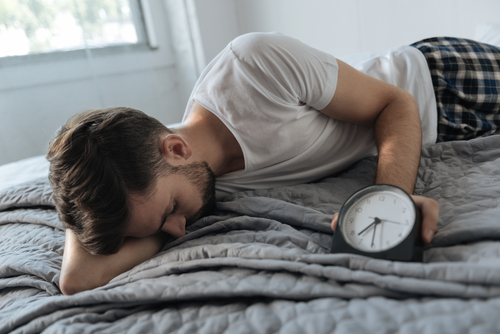Adrenoleukodystrophy (ALD), a rare genetic disorder that primarily affects the nervous system and adrenal glands, can cause an array of neurological symptoms that can impair a patient’s ability to get sufficient sleep.
Here is more information about how ALD can cause sleep disturbances and some tips to help improve your sleep quality.
How can ALD affect sleep?
Several neurological symptoms of ALD can cause trouble with getting enough restful sleep. These include peripheral neuropathy, or damage to the nerves to the limbs, which can lead to uncomfortable burning or tingling sensations in the arms, legs, hands, and feet. Muscle spasms, seizures, and bladder and bowel disorders also can impair your ability to get good sleep.
Some patients with ALD also may experience vision loss, which can lead to abnormal circadian rhythms — the normal sleep-wake cycle — as the disease progresses. In one case, a 13-year-old boy with ALD who became blind was found to have a 25-hour circadian rhythm instead of the normal 24-hour cycle.
Having a chronic, progressive disease such as ALD also can lead to anxiety, stress, and depression, especially in adults. All of these factors can make it harder to get restful sleep.
Tips to improve sleep
Here are some suggestions that might improve sleep quality.
Managing neuropathy
Peripheral neuropathy, which commonly occurs in the adult form of ALD, can lead to insomnia or trouble falling asleep. It is, therefore, important to try and manage it. Ways to potentially reduce symptoms caused by neuropathy include eating low-fat meals with lots of fruits, vegetables, and whole grains, limiting alcohol consumption, and quitting smoking. Lightly massaging the affected areas also may ease some of the symptoms.
Limiting nighttime bathroom trips
Bladder and bowel problems can lead to discomfort and the need for frequent trips to the bathroom during the night. Establishing a bowel regimen and timed urination can help increase the time between bathroom breaks. This could help you sleep longer and more comfortably during the night.
Limiting fluid intake before bedtime also can help reduce the need for frequent urination. Modifying the amount of fiber in your diet can help with bowel issues.
Lowering stress levels
Stress, anxiety, and depression can all interfere with your ability to get restful sleep. Consulting with a therapist or doctor may provide you with techniques and/or medications to help reduce these feelings.
Finding a support network where you can share tips and experiences with other ALD patients can help manage stress, as well.
Establishing an exercise routine also can help reduce stress and improve sleep quality.
Other tips
Talk to your healthcare team if you are experiencing trouble getting enough restful sleep. Your doctor may be able to prescribe medications to help you sleep or modify medications that could be affecting your sleep.
Patients who have irregular circadian rhythms due to vision loss may be treated with methyl B12 to help improve levels of melatonin. That’s the primary hormone that regulates circadian rhythms. Adjusting your melatonin levels may help you return to a more regular sleep schedule.
Changes in bedtime routine also may help improve your ability to sleep. You might try measures such as limiting screen-time before bed, having a comfortable mattress, reducing caffeine intake in the hours before you go to bed, and performing relaxing activities such as reading or taking a warm bath.
Last updated: Jan. 6, 2021
***
Adrenoleukodystrophy News is strictly a news and information website about the disease. It does not provide medical advice, diagnosis or treatment. This content is not intended to be a substitute for professional medical advice, diagnosis, or treatment. Always seek the advice of your physician or other qualified health provider with any questions you may have regarding a medical condition. Never disregard professional medical advice or delay in seeking it because of something you have read on this website.


